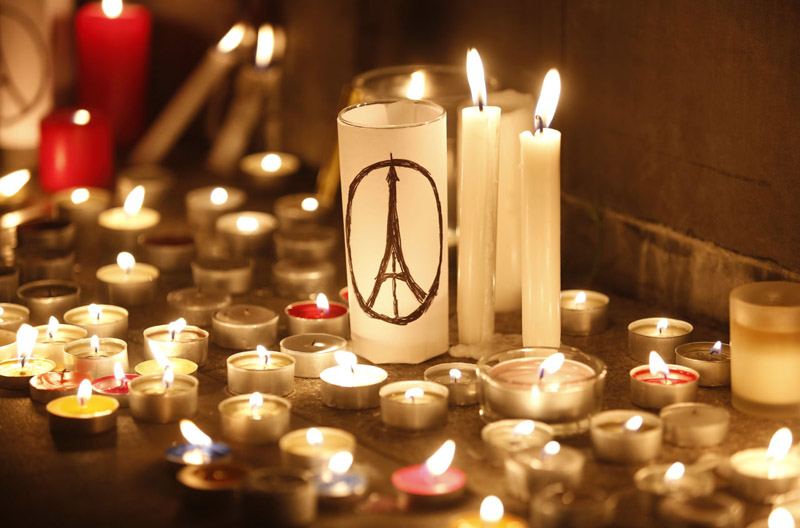Australia/Israel Review
The Last Word: Standing Up to Terrorism
Nov 30, 2015 | Jeremy Jones

Jeremy Jones
In mid-November 2005, Australians came together as never before. Women in hijabs hugging Jewish men in caps, Doc Martens-heeled youths locking arms with Indigenous elders – celebrating together as Australia defeated Uruguay at the Sydney Olympic Stadium to qualify for the 2006 FIFA World Cup.
A decade later, in mid-November 2015, eighty delegates representing the peak national Hindu, Christian, Buddhist, Jewish, Muslim, Bahai and Sikh communities gathered at NSW Parliament House, and began the day with reflection and silent prayer for those who had been murdered and maimed, terrorised and terrified, in the previous weeks and days.
Victims, as is well-known, included attendees at a football game, concert-goers and others enjoying a night out in Paris, men and women engaged in simple acts of daily living in Israel, those targeted for mass murder in Lebanon and Turkey, preceded by others in too many locations to enumerate here.
For many people, immediate responses to terrorist acts include fear, grief for the victims, sympathy for survivors and those who lost loved ones, and demands that governments provide both protection from further attacks and apprehension and prosecution of perpetrators.
As the perpetrators were quickly identified with the self-declared “Islamic State”, the relationship of Islam or Muslims to the events was the basis of a fair degree of attention.
A moral, principled figure, Imam Chalghoumi, whom I am proud to consider a friend, was as credible as he was forthright in his unambiguous condemnations of the perpetrators – people he said bring shame to the religion they purported to champion.
Other significant Muslim thinkers and activists committed themselves to redoubling efforts to be involved in leading the fight against people who acted on behalf of an organisation which has ideological documents steeped in Islamic texts and concepts, which appeals singularly to Muslims to join its fight and purports to provide opportunities to live Islamic lives and die Islamic deaths.
Pulling no punches, Muslims Australia (also known as the Australian Federation of Islamic Councils), stated it was outraged by “criminal acts committed by criminals” which have “no bases or justification in Islam”.
There were some commentators, seemingly rationalising that to do otherwise would promote unfair attacks on Muslims and Islam, who ignored or even rejected any connection at all between Islam and the terrorism by people who believe they are furthering an Islamic agenda.
One previously low-profile analyst given a variety of ABC platforms, went so far as to dredge up a questionable, dated analysis of attacks in the US, to claim left-wingers, Christians and Jews were more likely to be terrorists than Muslims – and then feigned upset that he could be considered an unhelpful contributor to serious understanding of the phenomenon.
The “usual suspects” of the xenophobic and Muslim-bashing fringes were also quick to try to capitalise on the Paris terrorist murders to further their agendas, as was to be expected.
They were given fodder by the public interventions of Australia’s Grand Mufti, who initially seemed to think that the bloodshed in France was a good opportunity to broadcast contentious grievances, effectively saying that terrorists have not just a degree of understanding, but sympathy from a person occupying a high religious office.
Having his credibility as a moral figure already under question due to his verbal support for the overtly anti-Jewish terrorists of Hamas and his tepid response to the murder of Curtis Cheng in Parramatta a month earlier, the Mufti would do well to heed the advice of Professor Clive Kessler.
Kessler set out a simple formulation which needs to be adopted and articulated by people with responsibilities for religious leadership, emphasising that “citizens of a modern democratic society and nation” can “live with sacred texts”, but can never endorse them being interpreted to justify violence and antagonism towards others.
The Sheikhs, Muslim scholars and youth who participated in the Parliament House forum found it not only possible, but natural, to condemn terrorism, antisemitism and any usage of religion to justify violence, contempt or division. That is the leadership, a real contribution to social cohesion, we require.
This article is featured in this month’s Australia/Israel Review, which can be downloaded as a free App: see here for more details.
Tags: Australasia






